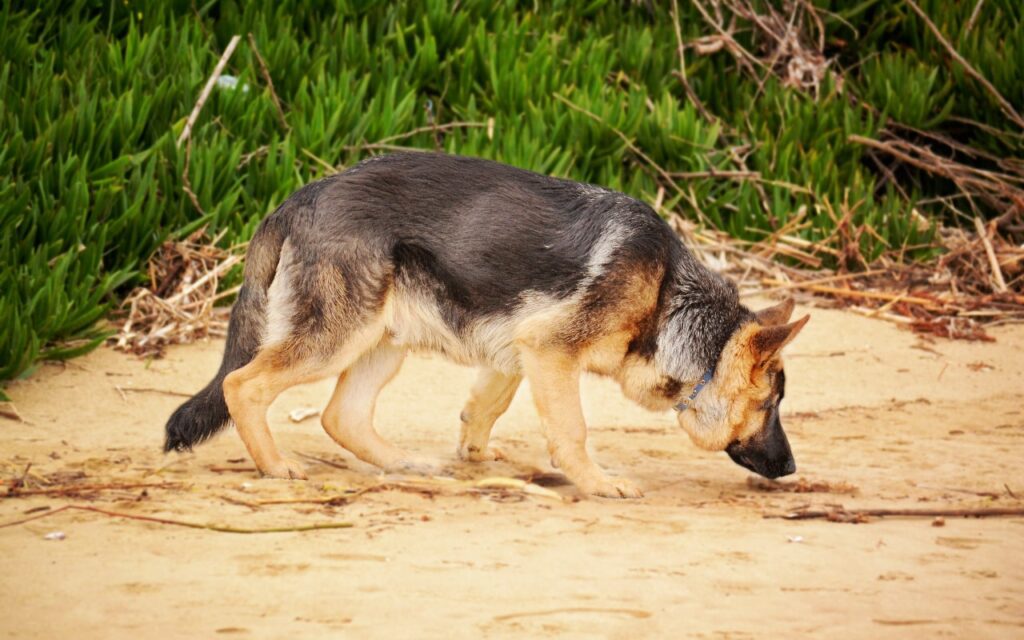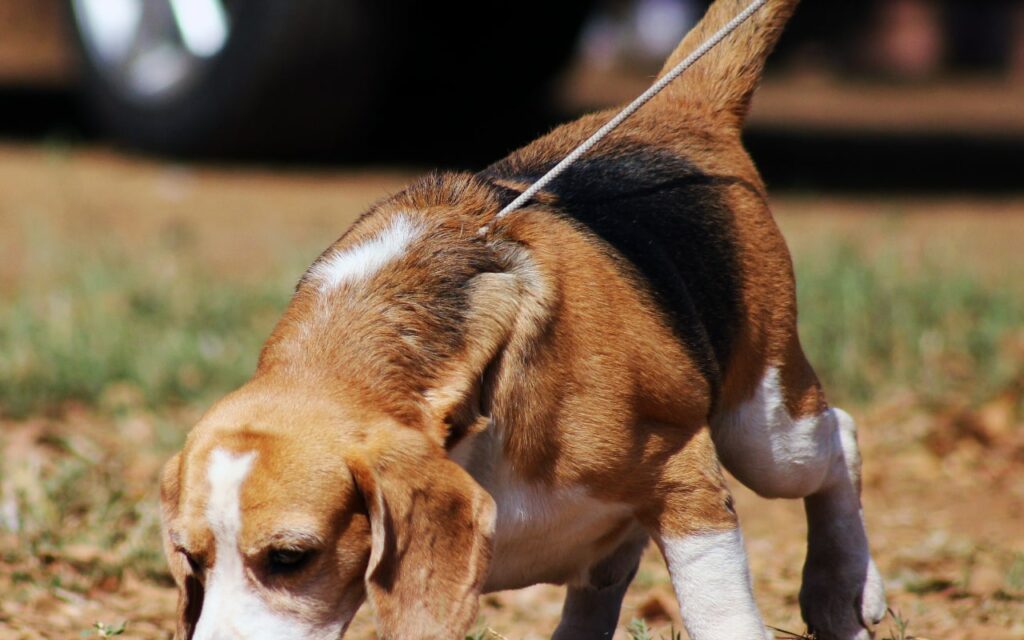Dogs are one of the most beloved animals to have in the home, but unfortunately, many dog owners can find themselves frustrated by their pup’s strange habits.
One such habit is eating mud. This behavior can be concerning and worrisome for any pet parent, so it’s important to understand why dogs eat mud and what you can do to prevent or stop them from doing it.
In this blog post, we’ll discuss the causes of mud eating in dogs and provide some potential solutions.
- Key Takeaway
- What Is Pica In Dogs
- Why Dogs Eat Mud
- Is Eating Mud Bad for Dogs?
- What to Do If Your Dog Is Eating Mud
- How to Keep Your Dog From Eating Mud
- Is Pica Curable in Dogs?
- Can Eating Mud Make a Puppy Sick?
- FAQs
- Q: What is pica in dogs?
- Q: Can eating dirt harm my dog?
- Q: Can eating dirt cause anemia in dogs?
- Q: How can I determine if my dog’s dirt eating is a health issue?
- Q: What can I feed my dog to discourage dirt eating?
- Q: How can I keep my dog entertained to prevent dirt-eating?
- Q: Are there any training techniques to stop my dog from eating dirt?
- Conclusion and final thoughts
Key Takeaway
- Pica in dogs is a behavioral disorder characterized by the compulsive ingestion of non-food items, which can include substances such as dirt, rocks, paper, cloth, or even feces.
- Dogs eat mud due to a variety of reasons such as boredom, curiosity, nutritional deficiencies, or behavioral disorders like pica.
- If your dog is eating mud, it’s important to discourage the behavior and consult with a veterinarian to rule out any underlying health issues or nutritional deficiencies.
What Is Pica In Dogs
Pica in dogs is a compulsive eating disorder where dogs tend to eat non-food items, like rocks, dirt, or clothing.
This behavioral issue can be quite dangerous, as the consumption of inappropriate items can lead to various health problems such as intestinal blockages, dental damage, and poisoning.
Pica can be driven by various factors including dietary deficiencies, boredom, stress, or underlying medical conditions.
It’s important to note that while occasional interest in non-food items can be normal for dogs, consistent or obsessive consumption is not and should warrant a visit to the vet.
Addressing pica often involves identifying and managing the underlying cause, whether it’s improving the dog’s diet, providing more mental and physical stimulation, or treating any medical issues.
Why Dogs Eat Mud

Dogs eat mud due to reasons like dietary deficiencies, boredom, stress, or an oral fixation.
Dietary Deficiencies
Dogs may consume mud if they’re not getting enough essential nutrients in their diet. The mud can contain minerals such as sodium, iron, and calcium that they might be lacking.
If a dog’s diet is homemade and not properly balanced, it could lead to them seeking out these nutrients elsewhere, like in mud.
Boredom and Stress
Just like humans, dogs can resort to odd behaviors when they’re bored or stressed. Eating mud could be a way for them to entertain themselves or cope with their feelings.
This is especially true if the behavior occurs more frequently when they’re left alone or during times of change or stress in the household.
Oral Fixation
Some dogs might eat mud simply because they enjoy the act of chewing. It could be part of their exploration of the world, as dogs use their mouths much like humans use their hands.
However, if your dog is consistently eating mud, it’s important to consult with a veterinarian to rule out any underlying health issues.
Seeking Probiotics
Interestingly, some dogs might eat mud in search of probiotics. Just like humans, dogs have a complex gut microbiome that can benefit from good bacteria found in the soil.
But again, consistent mud-eating behavior should be checked by a vet to ensure it’s not a sign of a more serious issue.
Is Eating Mud Bad for Dogs?

Eating mud can potentially be harmful for dogs, as it may contain toxins, pesticides, or harmful bacteria that can cause health issues.
While the occasional lick or taste of mud might not be a problem, consistent consumption can be concerning.
Mud can contain various contaminants such as toxins, pesticides, and harmful bacteria. These substances can lead to gastrointestinal upset, poisoning, or infections in dogs.
Moreover, if a dog is eating mud excessively, it may point to an underlying health issue or behavioral problems like pica, stress, or dietary deficiencies.
It’s important to note that while some dogs might eat mud out of curiosity or boredom, regular mud-eating behavior should be addressed with a veterinarian to ensure the safety and health of the dog.
What to Do If Your Dog Is Eating Mud
If your dog is eating mud, it’s important to intervene with distractions, provide adequate mental and physical stimulation, and consult a veterinarian to rule out any underlying health issues or deficiencies.
Provide a Distraction
When you notice your dog eating mud, one immediate action you can take is to distract them. This could be done with a verbal command, a loud noise, or by offering a toy or treat. The goal is to divert their attention away from the mud and towards something safer and more appropriate.
Ensure Adequate Exercise and Mental Stimulation
Dogs may eat mud out of boredom if they’re not getting enough physical and mental stimulation. Regular walks, playtime, and interactive toys can help keep your dog entertained and reduce the likelihood of them resorting to behaviors like mud-eating.
Check for Nutrient Deficiencies
Mud-eating can sometimes be a sign that your dog is lacking certain nutrients in their diet. High-quality dog food that is balanced and rich in essential minerals can help meet their nutritional needs and discourage them from seeking nutrients in mud.
Consult a Veterinarian
If your dog’s mud-eating habit is persistent, it’s recommended to consult a veterinarian. They can perform a thorough check-up, including a fecal exam to eliminate parasites as a potential cause. The vet can also provide further guidance based on their findings and your dog’s specific needs.
How to Keep Your Dog From Eating Mud
To keep your dog from eating mud, you should ensure they have plenty of toys and activities, give them enough attention and exercise, use taste deterrents if necessary, and consult a veterinarian to check for potential dietary deficiencies.
Provide Plenty of Toys and Activities
Keeping your dog busy with various toys and chewable items can deter them from eating mud. This gives them an alternative to focus their attention and chewing instincts on, reducing the likelihood of them resorting to mud-eating.
Give Adequate Attention and Exercise
A dog may eat mud out of boredom or lack of attention. Ensuring your dog gets enough physical and mental stimulation through playtime, walks, and interactive tasks can help curb this behavior.
Use Taste Deterrents
If your dog insists on eating mud from a specific area, consider using a taste deterrent like cayenne pepper or hot sauce. These substances are safe for dogs but are unpleasant to their taste buds, which can discourage them from ingesting the mud.
Consult a Veterinarian for Potential Dietary Deficiencies
Mud-eating can be a sign that your dog’s diet lacks specific nutrients. If you’re feeding them homemade meals, it’s possible they’re not getting all the necessary vitamins and minerals. A veterinarian can guide you on proper diet adjustments or supplements to meet your dog’s nutritional needs.
Is Pica Curable in Dogs?
Pica, the compulsive ingestion of non-food items, can often be managed in dogs, although it may require consistent effort and possibly medical intervention.
Pica is a condition characterized by dogs eating objects that are not considered food. This can include a variety of items such as cloth, plastic, wood, paper, or even rocks. While curing pica completely can be challenging, it can often be managed with proper care and intervention.
The first step to managing pica is to prevent access to non-food items as much as possible. This involves keeping such objects out of the dog’s reach and providing adequate physical and mental stimulation to keep them occupied.
In addition, dietary adjustments might be necessary. Sometimes, pica could be indicative of nutritional deficiencies. Feeding a balanced diet rich in essential nutrients or providing appropriate supplements can help reduce the pica behavior.
Behavioral training is another critical component of managing pica. Training techniques can help discourage the dog from eating inappropriate items and promote healthier behaviors.
Lastly, if the pica is severe or persistent, veterinary intervention might be necessary. This could involve medical treatment for any underlying health issues contributing to the pica or possibly medication to help manage the behavior.
Can Eating Mud Make a Puppy Sick?
Yes, eating mud can make a puppy sick as it can lead to gastrointestinal issues and pose a choking hazard.
When puppies eat mud, they are ingesting dirt and potentially other substances or objects that could be harmful.
This behavior can introduce bacteria or parasites into their system, which can lead to gastrointestinal upset, including symptoms like diarrhea or vomiting.
Ingesting large quantities of mud may also pose a risk of gastrointestinal impaction. This is a serious condition where the intestines are blocked by hardened stool, often requiring medical intervention.
This is particularly worrisome if the mud contains small rocks or other indigestible materials.
Beyond these internal risks, eating clumps of mud or dirt could pose a choking hazard, especially for smaller puppies. They may not be able to properly chew or swallow the mud, leading to potential respiratory distress.
FAQs
Q: What is pica in dogs?
A: Pica is a condition in which dogs develop a craving for non-food items like dirt, rocks, or sticks. It is a behavior disorder that can be caused by various factors.
Q: Can eating dirt harm my dog?
A: Eating dirt can potentially harm your dog if the dirt contains toxic substances like pesticides or if it causes digestive issues. It is important to prevent your dog from eating dirt to ensure their well-being.
Q: Can eating dirt cause anemia in dogs?
A: Yes, if a dog ingests large amounts of dirt or if the dirt contains substances that interfere with the dog’s red blood cell production, it can lead to anemia. Anemia is a serious health condition that requires veterinary attention.
Q: How can I determine if my dog’s dirt eating is a health issue?
A: If you suspect that your dog’s dirt eating habit is a result of an underlying health issue, it is recommended to consult a veterinarian. They can evaluate your dog’s overall health and perform necessary tests to diagnose any medical conditions.
Q: What can I feed my dog to discourage dirt eating?
A: Providing a balanced and nutritious diet for your dog is important to discourage dirt eating. Make sure your dog’s food meets their nutritional needs and consult with a veterinarian for specific dietary recommendations.
Q: How can I keep my dog entertained to prevent dirt-eating?
A: Keeping your dog mentally and physically stimulated can help prevent boredom-related dirt-eating. Provide interactive toys, engage in regular exercise and play, and consider training or puzzle games to keep your dog entertained.
Q: Are there any training techniques to stop my dog from eating dirt?
A: Working with a professional dog trainer can help address behavior issues, including dirt eating. They can provide guidance and techniques to redirect your dog’s attention away from dirt and discourage the behavior.
Conclusion and final thoughts
In conclusion, it is normal for dogs to eat mud.
Fortunately, in most cases, this behavior can be corrected by providing adequate nutrition and spending more time with your pup.
If these solutions don’t work, it may be worth consulting a veterinarian for further guidance.





Leave a Reply